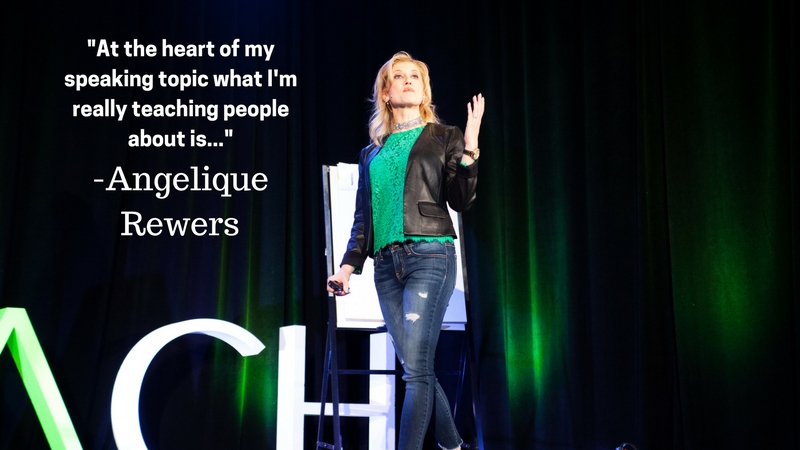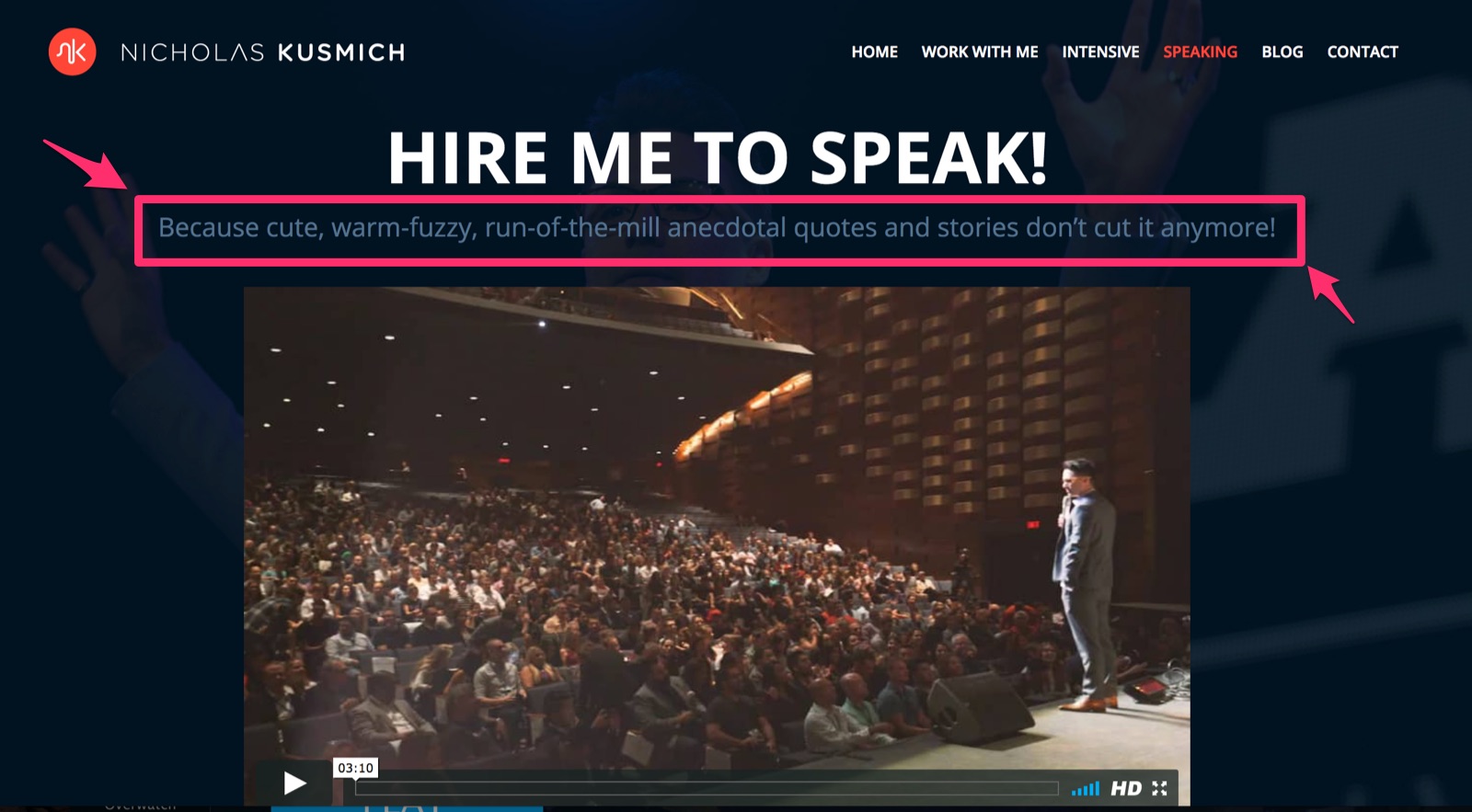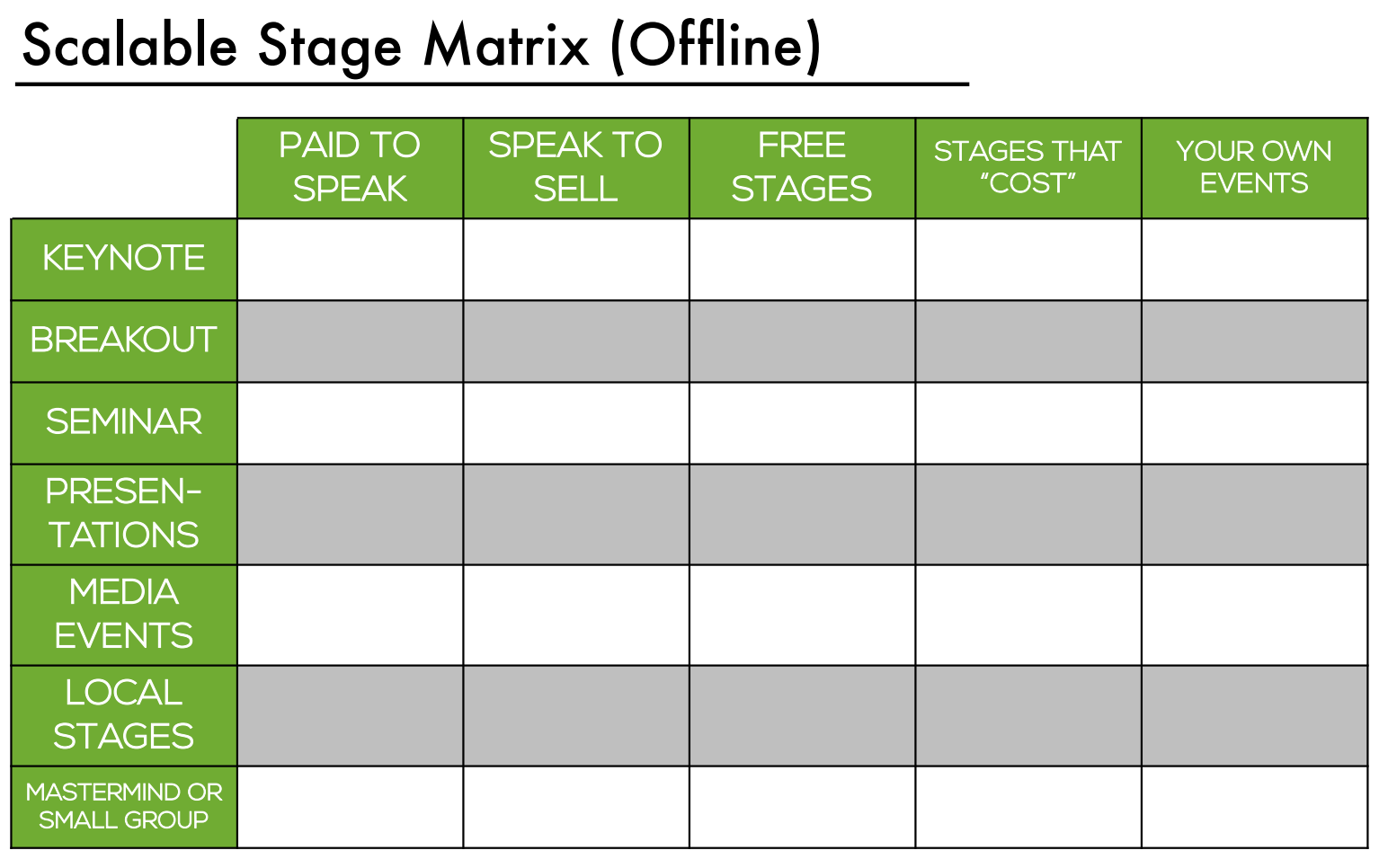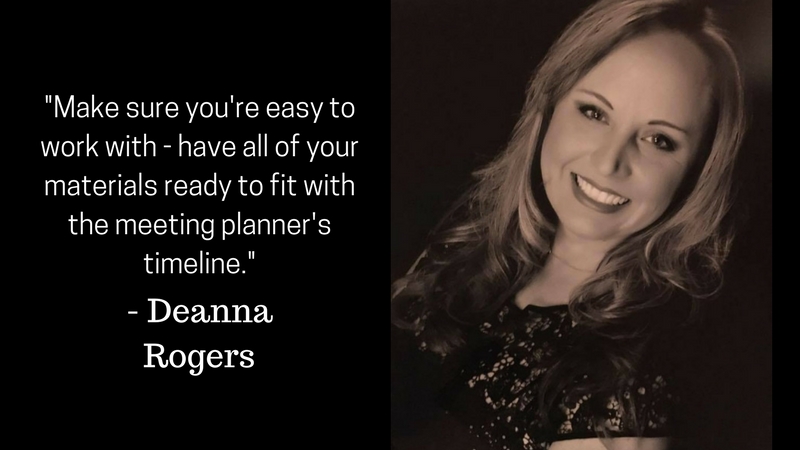Day 3 of Reach Academy Live focused on creating a business and offers that make it possible to create much more value from the stages you land. Where most speakers get hung up on how much their honorarium is, this event focused on creating a offers that scale beyond the stage, leading to much greater revenues down the road.
If you missed them, you can check out the highlights from Day 1 and Day 2 here.
There are many different ways to scale; each has certain advantages and drawbacks. Pete opened day 3, presenting the Stage Revenue Model, which serves as a map to help speakers identify what opportunities for scale.
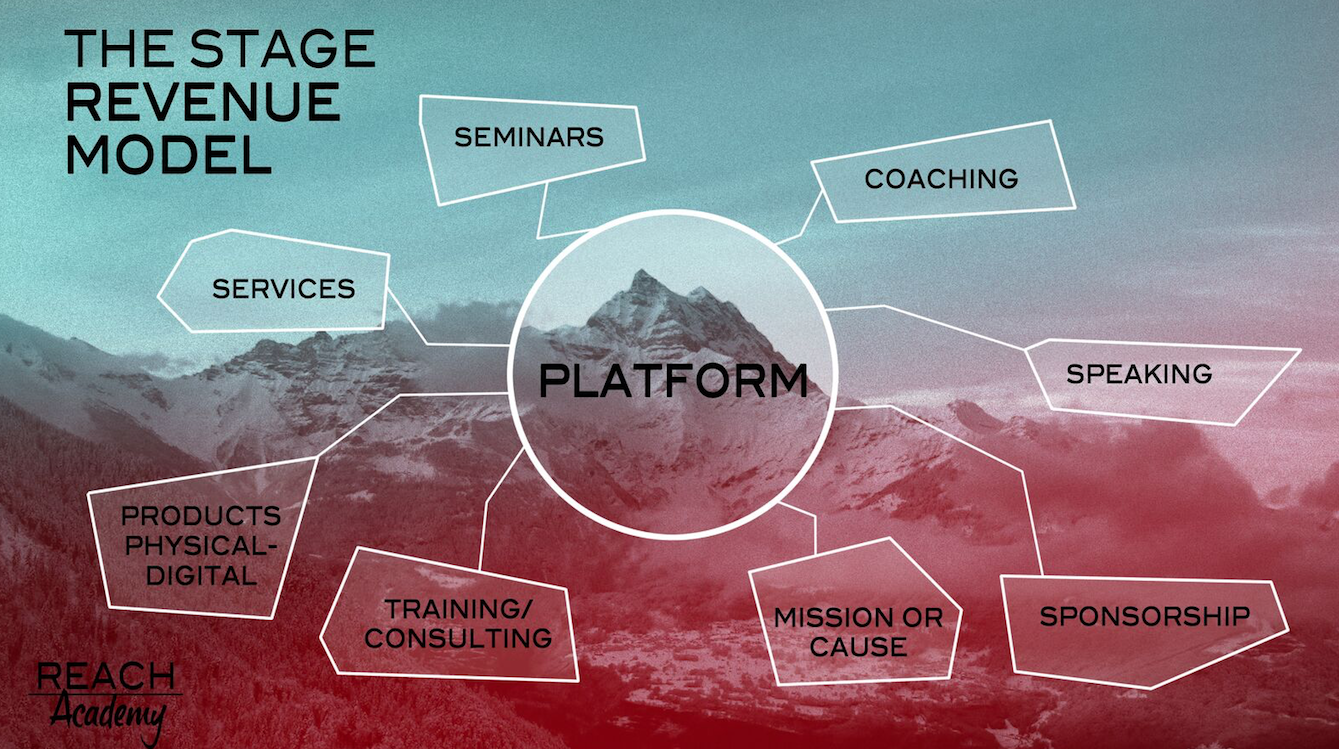
Scale is key for speakers to transition from “road warrior” taking any stage and living off the honorariums, to landing just a few dream stages a year that lead to big revenue, to building a team of speakers to spread their message for them.
With even one or two pieces of scale you can change the value of your stage from whatever the honorarium is, to multiple six figures by having products or services to sell beyond the talk. This is a game-changer for many businesses and many speakers.
How do I know what offer to develop?
With so many different products and offers to consider, it can be difficult to know which will work best for you.
To help decide, Pete has put together the R.I.P. (resistance, impact, profitability) filter system. This filter helps you decide where the best opportunities for your business lie.
Resistance – how difficult will it be to bring this to market? Look for opportunities with low resistance.
Impact – How much impact will this have on people’s lives? Will you be able to help a lot of people with this? Or at least a will this add a lot of value to the people you serve?
Profitability – You need to have a product that leads to profit. Without profit, you can’t scale your message or expand your reach.
As you read through the many different opportunities for stage revenue, consider the R.I.P. filter, and see which fits best for you.
Angelique Rewers – How to work with corporate clients
Angelique Rewers is a master at helping speakers with many different skills to find corporate clients. She pointed out the incredible opportunity for entrepreneurs in corporate markets.
In 2015, the global spend for corporations on training and professional development for their teams was over $355 billion, and that they regularly hire individuals and small firms to help them.
She further drove home her point showing a few key statistics about entrepreneurs and corporate clients. The average top-line revenue for solopreneurs is just $44,000, yet within 2 years of landing their first corporate client, their revenues increase by 264%. Better yet, 63% of small business owners who have corporate clients make over $500,000 a year.
She then walked the audience through the process of taking talk and turning it into 7 streams of income from corporate clients starting with, one simple phrase:
“At the heart of my speaking topic what I’m really teaching people about is…”
If you can answer that question clearly, then you can build a training program around it, sell it to corporations, and turn it into 7 streams of revenue:
- Get paid to deliver the content
- Get paid to create the content
- Get paid to teach your client how to deliver your content
- Get paid to allow your client to continue to use your content
- Get paid to record your training and share it with more employees
- Get paid to teach others your expertise (coach the coaches)
- Get paid to let others teach your content to their clients.
Few are really aware of the many diverse ways you can charge corporate clients, and often sell themselves short a lot of the revenue that a corporate client could generate for them. Use the list above to make sure you’re not leaving money on the table.
Sponsorship
Sponsorship is an often overlooked form of scale, especially for for-profit businesses. For-profits often assume there’s not much opportunity for sponsorship available. But each year there are billions of sponsorship dollars up for grabs for both non-profit and for-profit causes.
There are three keys to succeeding with sponsorship:
- You need to connect your sponsor with and asset. This is usually a talk or a program.
- You need to stand out from everyone else in your industry.
- You need to be connected to their target customer.
You can have your talks sponsored and deliver your content for free to a community that needs to hear your message at no cost to them. Or you can be sponsored to run a program and teach.
Just make sure that if you do win a big sponsorship deal that you don’t become overly dependent on that stream of revenue, it can go away quickly.
Fundraising
Ron Forseth shared his story of working with Pete to invite 15 couples to The Broadmoor, a luxury hotel in Colorado Springs, to share their story and ask for donations for his cause. Though spending over 70k on hosting these couples at a luxury hotel seemed like a gamble, they netted over 600k in donations from the event. He closed by encouraging the audience to master their story and have a powerful call to action that will make people excited to support your cause.
“You need to work on a story that’s going to change the world. The head’s not going to get it, the heart will help move them along, but a transformation call to action will get you there” – Ron Forseth
For more information on giving a great talk and storytelling for your business, check out: How the best speakers use storytelling as a business growth tool.
Courses – With Dr. Carrie Rose
Carrie Rose has many years of experience in public education and a PhD in educational leadership. She’s developed her own process for creating great courses.
She went on to point out some of the benefits of courses:
Huge demand – Though many people don’t see courses as a business model, Carrie pointed out how it’s a $107 Billion industry.
Scaleable – Creating a course once can drive value continuously.
Duplicatable – Once you learn how to create your first course, you’ll be able to repeat that process and create as many courses as you want. If you think of your content as a continuum, you can create courses that address the different areas of that continuum.
Courses for onboarding – Courses aren’t just for teaching customers. You can use them to onboard and train your team members. This is particularly powerful when you’re training people for a highly scaleable job like sales or customer service.
There are some common pitfalls that challenge many course makers. They are all challenges that can be overcome, but you need to have a good understanding of your audience and market, as well as strong confidence and belief in yourself to make it work.
They don’t sell themselves – Though the work creating a course only needs to be done once, you need to apply consistent effort to selling your course.
They take effort – A course does not have to take months or years, but it will take at least a few days of highly concentrated effort to create.
They require some technical skill – It can be challenging to manage all of the technology that goes into making a good course. They also require some moderate knowledge of audio, design, and writing.
A common problem that causes many courses to fail is that many people create very broad courses that cover many topics. Carrie encourages courses that dive deep into a specific and clear pain point. Many are afraid to do this because it usually means their courses come out shorter. But it’s a misconception to think to equate time invested with learning. It’s better to have a short course with a laser focus on a problem than a long one that does not go deep on any.
Hosting your own events
Hosting your own event can be one of the most powerful forms of scale, but it also one of the riskiest.
The upsides are:
- Good to build trust – Being on stage at your own event is one of the most powerful trust builders out there. You can build the same amount of trust in a few days from the stage that would take years from digital marketing.
- You make money on both ends – You can profit from the event tickets itself, or you can sell some of your offers on the back end. You also can take a cut from the sales of offers your speakers make.
- Build a community of fans – People go to conferences once because of a big name, topic, or opportunity, but they come back because of the people they meet. These communities and relationships keep people coming back to your events.
- Understand your customers – Hosting your own event gives you a place to do great market research and speak with many of your potential customers in person to learn their needs and create better offers for them.
Some of the downsides are:
- They’re expensive – There’s lots of little costs that can add up quickly. That soda that you would normally buy for $1 can be as much as $6 with all the markup, fees and taxes. Multiply that by the hundreds of sodas and $250 per gallon coffee you’ll buy for your guests and you can start to see how the expenses can snowball.
- They’re risky – Aside from the financial costs, events also demand a great deal of work. It’s a big challenge to fill a room as well. Unless it’s planned and marketed well, it could be difficult to profit or even break even on events.
Depending on your audience, style, and goals, you’ll decide the length of your event and how many other speakers you’ll need. You can host an event entirely on your own, but if you’re bringing more speakers in making sure they contribute to the event by helping promote it and adding value to the audience.
You’ll also need to choose where you host it, will it be a local one-day event that people can attend and return home to in the same day? Or will you promote it nationally and need to provide options for lodging?
Service businesses
Service-based businesses can do very well leveraging stages to drive customers.
Advantages of service businesses:
- High demand – Many high end clients only want to purchase “done-for-you” services.
- Big dividends – Done for your services can command a very high retainer fee, especially if they drive a lot of value for the business.
- You can leverage small stages – A good service business may only need to land one high end customer to have a successful event. Meaning they can leverage smaller stages more easily than someone who depends on selling a product.
Disadvantages of service businesses:
- High touch – Done-for-you services usually require a great deal of skill and time investment. This can make them hard to grow and scale.
- High expectations – When making a big investment into a service business, clients can often have very high expectations and little patience when waiting for results.
Setting good expectations early can help manage some of the downsides that are common in service businesses. You can start setting expectations even from the stage or in passing conversation.
Here’s an example of how to do that inside a story:
“A few days ago, I got a call from a big potential client. I let them know I could not start work with them for another few months and the work would cost $30,000. They said “We were thinking more like $20,000,” and they asked if I had a cancellation policy.
Now, I was willing to give them a bit of a discount if they paid it all up front but told them I didn’t have a cancellation policy, I only worked with people who were serious about this.
They respected this boundary and ended up taking my offer to pay upfront.”
Coaching and masterminds
Coaching and masterminds are often a good way to add some scale to high-end services. You can often coach several people in the same amount of time it would take to manage a single done-for-you client, you can even bundle the work into a group coaching program and work with many clients simultaneously.
It’s also possible to have your clients teach and support each other through masterminds. A mastermind is usually a small group that meets regularly to share insights on a certain problem and keep people accountable. As a coach or facilitator, you’ll still direct the group and the discussion, but you can allow space for your clients to teach each other. Your clients will still find value in being in a group of peers that they can relate to and work with.
Many people create Facebook communities to support their mastermind groups and give them a place where they can engage with each other. A great community is a powerful source of revenue, but it can be difficult to build successfully. If you’re interested in learning more about what it takes to manage a great Facebook community check out 8 Keys to Growing a Great Facebook Community.
How to create value through narrative
Nicolas Kusmich is a master of Facebook ads and a dynamic speaker. He opened his talk by asking the audience:
“I’m selling a used car for $1,000,000… does anyone want it?”
Predictably, nobody raised a hand. He then went on to describe the car in more detail. This was a 1960 Ferrari worth over $10 million. He asked again if anyone was interested and many more hands raised. He pointed out how, through the background story of the car, its perceived value dramatically changes.
We can create this same effect with our Facebook ads. Often we try to make an offer through Facebook in the same way that Nicolas tried to sell the car at first to us, no narrative, no value. Nicolas provided a framework to help create value in our ads.
Nicolas is known for making statements that trigger a perfect mix of confusion and intrigue. He lived up to his reputation when explaining his framework for a perfect Facebook Ad – “A good ad F.A.R.T.S.”
Here’s what he means by F.A.R.T.S.:
Forward moving – It hits on a powerful emotion and encourages action. It also has an image that stands out in the newsfeed and tells a story in itself that supports the narrative of the ad.
Applicable – It’s clear how your message applies to their life.
Relevant – The solution you present needs to make sense to them and connect with the emotions you conjure in your copy.
Titled well – A good title will call out who the target customer is, and capture their interest and attention enough to get them to take action.
Closing remarks – take action
Reach Live closed with Pete Vargas encouraging the audience to take action on what they’ve learned over these past few days. It’s easy to leave an event like that with good intentions and a sense of productivity. But as we return to our normal lives, energy and momentum tend to slip away. The plans we made in and goals we set face inevitable setbacks and challenges.
Pete shared the 3 things that kept him going during one of the most challenging times in his life.
- Purpose – You must connect with something bigger than yourself that will keep you going through any challenge.
- Community – A community of people that will be there for you and support you when you need them most.
- A mission – A purpose for yourself and a plan to fulfill it will bring meaning to your life and help give you direction. Even though your plans may not work perfectly, your mission will give you the strength and perspective to figure it out and continue.
He recalled a video from Price EA he shared to open the conference:
Pete shared his desire to be liked by everyone in the audience, but that has resulted in problems for him in the past. He would not speak his mind when people told him “they weren’t quite ready” or “They’ll take action once X is done” but he found they leave with the best intentions, but nothing changed and they would often lose touch.
Don’t be one of those people that disappear and never takes any action.
Don’t be the person that comes back to the next event exactly the same.
Don’t let your ideas, aspirations, and dreams end up in the graveyard.
Don’t miss out!
These takeaways are just a small piece of the value you can expect from Reach Academy Live, in addition to great talks you can expect to meet amazing people, form lifetime relationships, and grow your business beyond what you thought possible.
Get your tickets to the next Reach Academy Live in November here.

